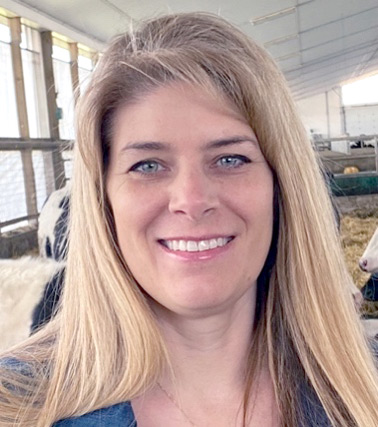2020 has been a whirlwind year for Ontario agriculture. As farm business owners, we had to be flexible and proactive as we adjusted to a new reality. The pandemic first hit our province in March of this year and has continued to keep our sector on its toes with changing regulations, public health restrictions and loss of traditional market streams for our products. Together with many partners, the Ontario Federation of Agriculture (OFA) has accomplished a tremendous amount of good for the sector, laying a strong foundation for a post-pandemic road to recovery.

TRACEY ARTS
Starting my new role as Director of Zone 4 during a pandemic was definitely an adjustment to what I initially thought the role would be. As I began my term, the province was in the process of determining how to handle the news of the pandemic. The pandemic caused a fundamental shift in our organization, but in true farmer fashion, we adapt and make the best with what we have.
The Ontario agriculture industry has collectively overcome significant obstacles and disruptions, including labour shortages, rail strikes, food processing shutdowns, volatile markets, and a freedom-of-information request among a long list of other issues. Despite these challenges, advocating on behalf of our members remained a top priority for OFA. We continued to champion the diverse interests of our 38,000 farm families.
In early March, our members had to pivot to virtual meetings in order to maintain provincial safety regulations. This change was a big adjustment for a community that values face-to-face interaction, however, our organization was overwhelmed by the cooperation and willingness from our members to embark on this virtual journey with us. We not only adapted to virtual as an organization – we thrived. Throughout the pandemic, our organization has been able to effectively run virtual booths and events, annual provincial and county-level meetings for monthly business, as well as county regional and annual general meetings culminating with our first ever OFA wide annual general meeting, all successfully through online platforms. We are grateful for our members and counties who have adapted to making these virtual meetings successful, and were overwhelmed by the participation and support shown at our annual general meeting.
I experienced my first advocacy challenge less than a week into my new role. It is a well-known statistic that the farming community makes up two per cent of the population and often, rules and regulations do not initially reflect the unique needs of our sector. In this case, public health had declared a vague and ominous restriction on farmworkers, which would limit them to only working at one farm in the hopes of reducing the spread of COVID-19. As a dairy farmer myself, I knew that this would cause significant issues for Ontario’s farming families. To solve this issue, I was given the opportunity to work with the Southwestern Public Health Unit (SWPH) and lobbied for clarification to ensure that public health restrictions fairly addressed the unique needs of the agriculture sector.
Along with other lobby efforts, the OFA team worked to ensure that our members had the tools required to navigate COVID-19 successfully. Communications pivoted to develop resources to help our members navigate effectively. OFA created a summary of financial programs available to farmers, along with a producer’s guide to selling directly to consumers throughout the pandemic, a guide for minimizing workplace risk, and fact sheets with the most up-to-date information on our website.
Throughout the pandemic, we continued to advocate hard for the pressing issues affecting our membership. In a year like no other, OFA lobbied for Bill 156 to be put into force, in order to protect farm animals, the food supply, as well as farmers and their families. We also put our lobby efforts into furthering investments for broadband and cellular expansion, for expansion of natural gas infrastructure for rural, northern and remote communities, and for funding to increase to Ontario’s Risk Management Program. Additionally, OFA successfully influenced the Ontario government to address our concerns regarding the Not-For-Profit Corporations Act (ONCA) and spearheaded the Freedom-of-Information (FOI) request settlement. You, our members, have also been a large part of this success, as you have all been active advocates, locally holding meetings with politicians to address key priorities and issues within our sector.



